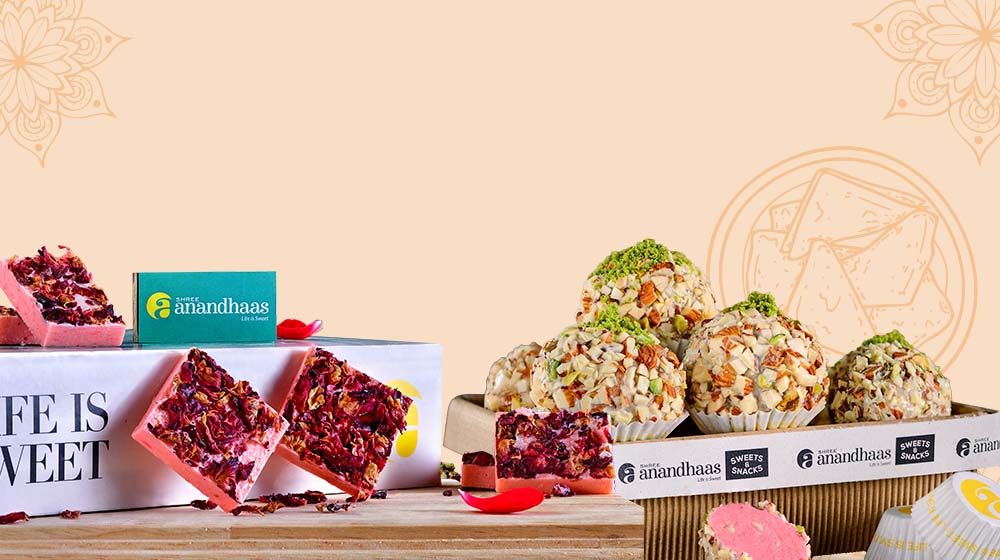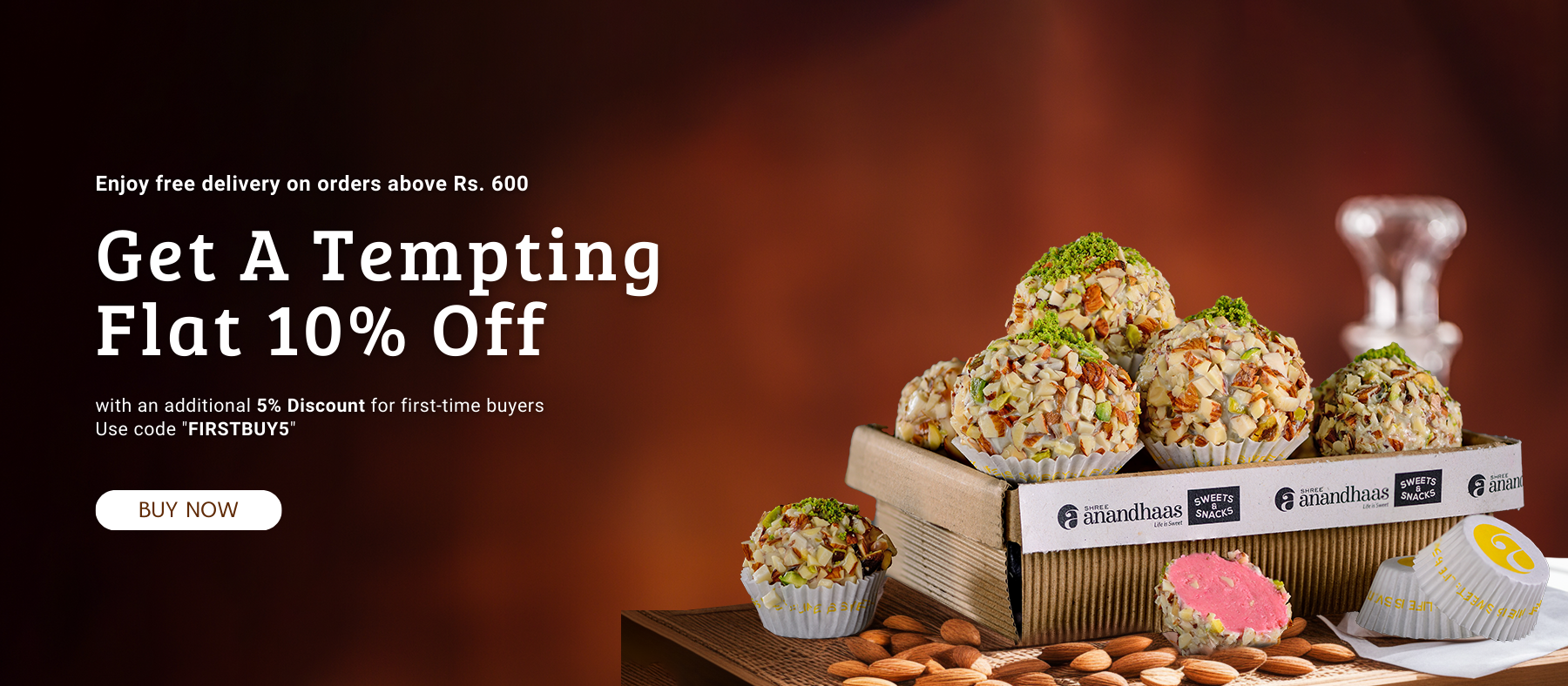
The importance of sweets in Indian Tradition
Oh! It's Diwali... Let's have some sweets.
Hey, it's Pongal.. Let's buy some sweets.
Meeting family after a long time.. Let's gift some sweets.
Be it any occasion, festival, or just a get-together with friends, we always hear this from our homes:
“ Chalo Kuch meetha ho jaye..”
Have you ever wondered how and why it is so special for us?
Like sweets have become such an integral part of our livelihood that none of us can think of our lives without them.
Even our Gods love Sweets, don't they?
But why is it so important and special for us?
Why this fixation with sweets?
From north to south and east to west, Sweets have become a bond that connects us all.
It's an essential component of each and every celebration. Each festival brings with it different types of Indian sweets, and different parts of India have invented their own sweet specialties for celebrations.
All things sweet are associated with our Indian occasions and festivals, and sometimes even savoury is included in celebrations.
It's time for history lessons!
There is no other country like India wherein such wide varieties of sweets are found, or you find people who are wholeheartedly or invested in it. We not only have a rich cultural history, but also our association with sweets is around a millennium old.
We were the first to refine sugar, at around 500 BC. The sugar revolution was such that by 300 BC, five different kinds of sugar were processed in India.
The west might have given India machines and technology, but India is indirectly responsible for the desserts the world is enjoying today!
Also, we all know that Indian temples believe in the concept of purity or satvik living. We first offer prasad to the Gods and then to everyone else, and as our culture goes, only pure food is offered to the Gods.
Thus Indian mithai, or Indian sweet, which is always made of pure ghee, sugar, and milk as its primary ingredients (all satvik) is often chosen for this purpose.
All the things that go into making these sweets are pure, and they are considered safe for offering to Gods in temples.
This ritual has been passed down through the ages. From ancient times, sweets were considered pure and offered to others before self-consumption. Hence our Indian sweets find a place in everything auspicious.
While we have seen that different parts of the country continue to whip up their sweets based on their taste and traditions, the key ingredients remain similar.
It's Sweet time!
Let us look at the different varieties of Indian sweets passed on for generations.
The Royal Mysore Pak

Nothing can beat the richness, simplicity, and amazing taste of Mysore Pak.
It is a delicious & simple sweet made with mainly three ingredients- gram flour, sugar, and ghee resulting in something so delicious that it is hard to stop at one.
Originating from the Royal kitchen of Mysore, legend has it that Kakasura Madappa, the head chef of the Royal Kingdom of Mysore, was the creator of this delicious delicacy.
Regardless of the story of its origin, there is no denying that this all-time favourite Mysore Pak, has become the ambassador of India's rich culinary history to the rest of the world and will continue to rule the palate even in the coming time.
In the present time, this simple Mysore Pak has got itself many different forms. From medium sweet to high sweet, Mysore Pak is available for every taste bud today. You can even order this sweet online from Shree Anandhaas, who has mastered the art of this delicacy.
The sweets here are made only with pure ghee and have the same authentic taste. Click here and taste for yourself.
The Mighty Laddus
The omnipresent sweet in every festival, the mighty laddus.
Among all the amazing varieties of Indian sweets available, Laddus has become the most popular one, and more importantly, every region in India has its own variety of laddu today.
The origination of laddus dates back to the time of the Chola Empire; at that time, this sweet was packed for travelers & warriors as a symbol of good luck for their expeditions.
In the present time, these laddus have become a necessity for every occasion. Made with Besan, Pure Ghee, Premium Quality Sugar, Cashew nuts, and other ingredients, these laddus can fill your heart with love in just one bite.
Even our gods love laddus, be it Lord Balaji or everyone's favourite Hanumanji; laddus are offered as a prasadam in all their temples.
A replica of the most blessed prasad of Lord Sree Venkatachalapathy's shrine is also available at Shree Anandhaas. This laddu can take you to the sacred confines of the abode of the gods while you stay in the comfort of your home.
At Shree Anandhaas, their sweets are made with state-of-the-art techniques and give the same authentic taste, which can take you back to your childhood memories.
Although the classic laddu is everyone's favourite, nowadays, a variety of laddus is available. Have you ever heard of Badam Rose Laddu?

It is a delicious union of almonds and roses. One of Shree Anandhaa's own delicacies, this sweet is a must-try. Lose yourself in this match made in heaven. You can also check out their other laddu varieties here.
The best for the Last - Kaju Katli
How can we forget this?
Famous because of its diamond shape and great taste, Kaju Katli is a classic Indian delicacy prepared with Cashew nuts, Sugar, Ghee and Edible silver leaves.
Traditionally consumed during the Diwali festival, this amazing treat is a lovely gift for friends and families. In Indian culture, it is believed that eating kaju katli brings good luck & prosperity to one's home.

Did you know this famous sweet was invented by Guru Hargovind, the 6th Sikh Guru, when he was captured along with 52 other monarchs by the then-Mughal emperor Jahangir?
This sweet was made to enhance the life of the prisoners by making them self-sufficient inside the fort with this sweet.
Crazy, isn't it?
How all our sweets have an amazing survival story behind them!
Nowadays, during Ganesh Chaturthi, a celebration commemorating Ganesha's birth, kaju katli, is frequently made.
If you want authentic taste, check out Shree Anandhaa's premium quality sweets. All their ingredients are sourced fresh and made of premium-quality cashews, pure ghee, and sugar.
Experience the best quality & flavour in every bite of their delicious Kaju sweet. They also have online delivery options, and they use the maptech packaging method to ensure that the product gets delivered to you safely and also holds a longer product shelf life.
From gift boxes to bulk orders, they provide only premium-quality packaging.
Indian sweets can thrill your tastebuds and stimulate your senses with beautiful, unique, and truly mouthwatering tastes. Hence, for us Indians, Sweet is not just food but an emotion, happiness, and celebration for many.
But, for some reason, you are unable to eat sweets or are not allowed to have a high sugar intake, so no worries, we have a great surprise for you!
Check out this collection of karupatti & sugar-free sweets. These sweets are made of palm jaggery and are super tasty. Don't believe us? See for yourself.
Be it a birthday party or any usual dinner or lunch; nothing can be complete without having a sweet. And while today there are various
interesting and unique options to choose from, nothing strikes the comfort and love of a traditional Indian sweet.
From Gulab Jamun to Rasagulla, Jalebi, or all-time favourite Kaju Katli, Indian sweets have a separate fan following. Our sweets are cooked, baked, roasted, steamed, boiled, fried, and frozen.
Diwali is not only the festival of lights but also the festival of sweets. India has had a long and rich tradition of sweets or 'mithais,' and they have an eternal significance in Indian culture. Sweets signify happiness, celebration, good omen, & prosperity. No festival, ceremony, or occasion can be complete without Indian sweets.
We don't just eat sweets as dessert after a meal; we eat sweets before, during & after the meal.
After all, Sweets are our first love.. isn't it?

